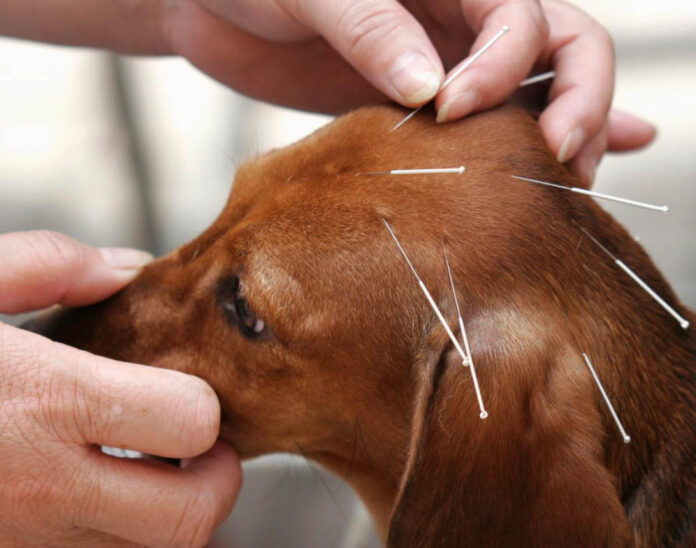We talk about ‘complementary’ rather than ‘alternative,’ treatments because each type has something that contributes to the whole treatment.
Holistic veterinarians believe in what they do, despite a lack of scientific evidence that the tools of their trade – acupuncture, herbal medicines, homeopathy and other complementary therapies – prevent or cure illness in pets.
A lot of people like the way their arthritic dog behaves after a round of acupuncture, or how a dog’s infection clears up completely with homeopathic treatment. But holistic veterinarians also understand the limits of such therapies and prefer to use them alongside more conventional ones.
So what are the most commonly used therapies?
Acupuncture is probably the most well-known complementary therapy. People have found both needle and laser acupuncture beneficial for thousands of years, so why not for our pets.
Horses also benefit from treatments and as the equipment is mobile, treatments can be done in the stable or field.
Acupuncture is one of the safest forms of medical treatment for animals when it is administered by a qualified professional. Side effects are rare, but they do exist. The success of the treatment will vary according to the condition being treated and the number and frequency of treatments.
The length and frequency of the treatments depends on the condition of the patient and the method of treatment needle or laser acupuncture.
A simple acute problem, such as a sprain, may require only one treatment, whereas more severe or chronic ailments may need several treatments.
Reiki is another alternative therapy now being applied to animals for disease treatment and general wellness. Reiki animal practitioners can be found in Ireland and work with healing energy hand in hand with veterinary practices all over the country.
Vets and vet nurses have been using energy healing, without a naming it, for years. I say “a compassionate hand is a healing hand”. Reiki animal healing does not involve the administration of any drug, just gentle contact with the animal, so it is unlikely to do your pet any harm. Reiki can be calming and is recommended for treating pain, anxiety and lots of other conditions.
Aromatherapy: When dogs, cats, horses and many more animals get sick, they seek out certain plants to eat in order to get well. Essential oils have a very profound effect on shelter, rescue and adopted dogs. They help the dog bond with the owner after a traumatic experience.
Like humans, lemongrass is good for cruciate ligaments and joint injuries. Lavender and a blend of valerian, vetiver, petitgrain, sweet marjoram and sweet orange are good for calming and relieving stress in dogs. For arthritis, use the anti-inflammatory blend peppermint, cypress, juniper berry and lavender. Dogs and horses, being similar to humans, tolerate oils better than other animals.
A word of warning though NEVER use these oils with cats and birds as doing so can cause them harm. Always seek advice from a practitioner before using aromatherapy with animals.
Bach flower remedies are medicines used to balance negative mental states and emotions. There are 38 remedies that come from the flowering parts of plants, bushes and trees. They are liquid so that you can mix them together, which gives a 293 million possible combination, enough to treat every possible negative mental state. They can work very gently and they do no harm, and are particularly effective when used alongside reiki.
Pheromone therapy has been very successful in the last few years with the development of Adaptil and Feliway to help with fears and phobias in cats and dogs.
Homeopathy, herbs, massage, hydrotherapy, dietary manipulation and even yoga with your pet are all available in Ireland and many practitioners are right here in Clare.
Does it work? Well animals don’t have a preconceived scepticism, so perhaps ask a professional to help.
A native of Ennis, Colin McGann has been editor of The Clare Champion since August 2020. Former editor of The Clare People, he is a journalism and communications graduate of Dublin Institute of Technology.


